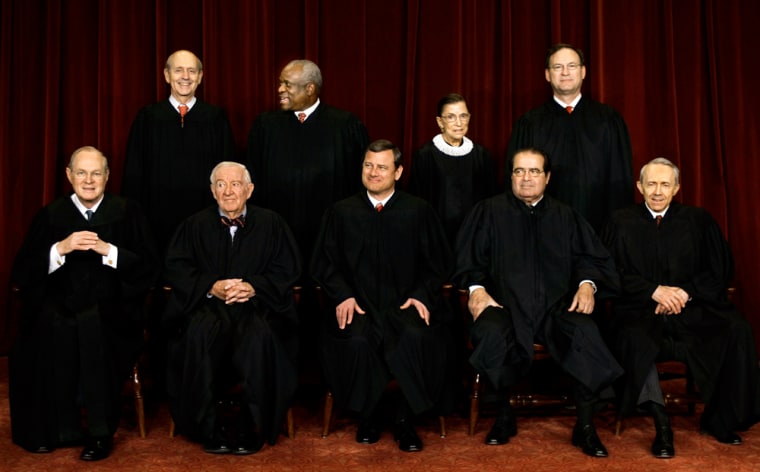WASHINGTON — The judicial branch of the government lived up to its task during the last year, working as a check on both the White House and Congress.
Between the Supreme Court's striking down of the Bush administration’s plan to conduct military trials for war-on-terror detainees and the pursuit of allegedly corrupt government officials, it was a busy year for the Justice Department.
With decisions expected on the National Security Agency's Terror Surveillance Program and the Lewis “Scooter” Libby trial getting underway in January, 2007 is expected to be just as decisive.
The year that was: 2006
Legal rights reshaped in war on terror
The Justice Department struggled to respond to a setback delivered in June by the U.S. Supreme Court, which struck down the administration's plan to conduct military trials for detainees picked up in the war on terror. The court’s five-member majority held that the military tribunal rules failed to follow a long-standing federal law requiring all military courts to provide fair trial rights.
Congress passed a new law allowing terror trials before military courts but providing more protections for defendants. Even so, the law raised new questions about the appeal rights of detainees.
Terror Surveillance Program
Attorney General Alberto Gonzales pushed Congress to find a way to resolve legal doubts about the government's Terrorist Surveillance Program, the NSA-run effort to monitor the calls of suspected terrorists.
Officials conceded that the program could involve listening in on the calls of American citizens without a court order. The administration disclosed some of the program's details, once among the most closely held secrets, after its existence was reported by the New York Times. Well over a dozen lawsuits were filed in federal courts, challenging the constitutionality of the program. But when the Congress finished its work in early December, no agreement had been reached on clarifying the program's legality.
Terrorism prosecutions
New statistics showed the number of federal terrorism prosecutions dropping to its lowest point since 9/11, with the new cases filed being generally less dramatic.
Seven men in South Florida were accused of being part of a terror plotting to attack prominent buildings, including the Sears Tower. And an Illinois man was accused of planning to set off hand grenades at a shopping mall. But in neither case did those arrested get very far in their planning or even appear to have many resources to carry out an attack.
Nonetheless, the government defended its record. "We could await further action by these men and then arrest and prosecute them. Or we could prosecute at the moment our investigation reveals both a risk to our national security and a violation of our nation's laws," said Paul McNulty, the deputy attorney general.
High profile prosecutions
A growth area for federal prosecutors came in high profile cases involving government figures. An investigation of Congressman William Jefferson, a Louisiana Democrat, touched off a prickly battle over access by FBI agents to the offices of members of Congress.
And Jack Abramoff, once Washington's lobbying super-power, made a surprise decision to admit that he tried to bribe congressmen and senators to get official favors for his clients. His plea launched a series of investigations into whether members who received Abramoff's payments broke the law.
Former Enron executive Jeffrey Skilling reported to prison in December, the final step in the Justice Department's high profile prosecution of the former energy giant. The government's Enron task force obtained more than a dozen guilty pleas. Company founder Ken Lay died after a jury convicted him but before he could be sentenced.
Violent crime spike
Despite FBI statistics showing only a modest increase in violent crime nationwide — up 2.3 percent, with murder up 3.4 percent — many of the nation's police chiefs warned that in their cities, violent crimes were spiking.
A survey of 55 cities by the Police Executive Research Forum found murder up in 32, robbery up in 44, and aggravated assault rising in 28, all from January to June. Among the causes, a spread of gangs beyond the biggest cities, an epidemic of guns in younger hands, and acts of spontaneous violence over trivial slights.
What to watch in 2007
Terror Surveillance Program
Justice Department officials will try again to urge Congress to pass a law clarifying the legal status of the Terrorist Surveillance Program. But Democrats in Congress may try to restore appeal rights for terror detainees, giving them greater legal authority to challenge their detentions. Court rulings will be due early in the year that could provide similar protections.
Vice President Cheney to take the stand
Dick Cheney will likely become the first sitting vice president to testify in a criminal trial. Lawyers for Lewis “Scooter” Libby, his former chief of staff, expect to call him as a defense witness in Libby's perjury trial, which begins in January. Libby is accused of lying during the investigation of the CIA-Valerie Plame leak case.
Abramoff fallout
The fallout from the Abramoff lobbying scandal could bring further prosecutions against members of Congress
Need to stem violent crime
Pressure will likely grow on the Justice Department to find ways to help cities respond to the spike in violent crime.
